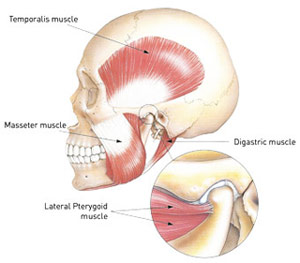Massage Therapy and Temporo-mandibular Joint (TMJ) pain or dysfunction
 Our jaws. We use them to eat with. We use them when we talk and to move our faces for expression. We often clench them when we’re stressed, or working hard, or often without even knowing it. Many of us even clench them in our sleep.
Our jaws. We use them to eat with. We use them when we talk and to move our faces for expression. We often clench them when we’re stressed, or working hard, or often without even knowing it. Many of us even clench them in our sleep.
The TMJ connects the mandible to the temporal bones of the skull and is a common place to hold tension. TMJ pain can often result from injury due to whiplash. It may arise after dental work or oral surgery. It can also occur from poor posture, especially a head forward type posture.
When left untreated this tension can cause some of the following problems:
- Headaches
- A bite that feels uncomfortable or “off”
- Neck, shoulder and back pain
- Swelling on the side of the face
- Tinnitus or ear pain
- Dizziness
- Clicking, popping or grating sounds in the jaw joint
- Inability to open or close the mouth comfortably
What can you do?
- Maintain good posture while working at a computer, watching TV and reading. Pause frequently to change position, rest hands and arms, and relieve stressed muscles.
- Make a habit of relaxing the facial and jaw muscles throughout the day.
- Avoid chewing gum and eating hard foods.
- Apply moist heat to increase the circulation around tense jaw muscles.
- Use relaxation techniques to reduce overall stress and muscle tension in the entire body.
How can we help?
Massage therapy can be very helpful in relieving TMJ pain and or dysfunction. Your RMT will assess your overall posture and neck and jaw mobility. They will release any muscles causing imbalances to allow your neck and head to rest more comfortably on your spine. This will likely include work on the neck, head, and face musculature, as well as the cervical joints. Intra-oral work may be used. This requires the therapist to wear gloves and work inside the mouth to release affected muscles. Cranio-sacral work may also be used to mobilize the bones of the skull.